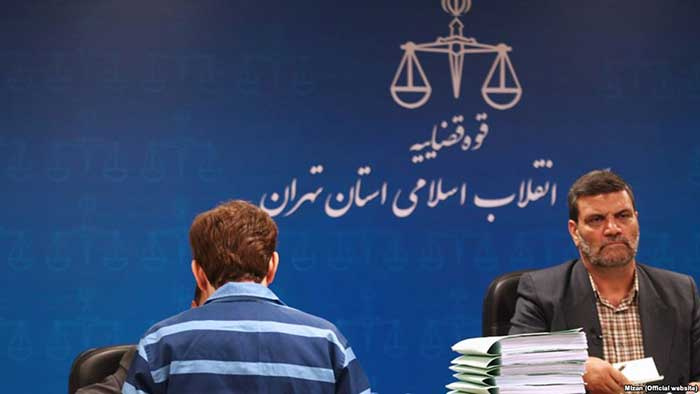Redefining Reformism: An imperative for administrative improvements

(Picture: Babak Zanjani, Iranian trader accused of multi-billion dollar appropriation of public money, in a trial session.)
Anumber of Reformists still believe the paycheck scandal is a political game thrown by the opponents of the Rouhani administration; and that to continue the game is to fall into a trap set by the rival. The truth is the paycheck scandal has not been political in the first place.
The scandal rose from a sense of inequality that has always been there [in the Iranian society] but has now aggravated. The accessibility of social networks also contributed to the situation. Employees in an administration are now able to quickly share their sense of dissatisfaction and inequality with others. Since the sense of inequality is equally widespread in the society, it makes the rounds as quickly. The political camp opposing the administration will stand to play with it for a while but have no desire to extend it.
Multi-digit paychecks are not limited to the administration and its subsidiaries. A larger source of such paychecks could probably be found in public institutions, funds and organizations where the administration plays no role. Furthermore, those on the receiving end of these paychecks are usually non-political individuals who have emerged from the turbid, inefficient bureaucracy and have no partisan inclination, ready to work with every administration -- the kind of individuals that fish in troubled waters. Transparency is a deadly poison for both groups, i.e. the critics of the administration and the opportunist bureaucrats. Transparency has few friends and many foes. Thus, the theory that the opponents are propagandizing against the administration is basically wrong. The administration’s critics are ready to manipulate the scandal as a media game for a week or two.
But the main issue here is societal. Disillusioned, unemployed citizens helplessly dealing with stagnation and frustrated at the reality of inequality are the driving force behind the sociopolitical wave that the paychecks have become. If ignored, the driving force will bring unfortunate consequences. And if taken seriously, transforming the public demand into energy for national determination in order to reform the administrative system, it could turn into a landmark in the history of Reformism in Iran.
It is now time to define Reformism and the paycheck scandal is a turning point that requires the definition of true Reformism. Reformists and Principlists in Iran diverge on two issues – foreign policy and unclear slogans in domestic policy. There is no question as far as foreign policy is concerned. Reformists tend to be more compromising with the outside world. The ambiguous slogans of the two group in domestic policy include political development and 'protection of values' respectively.
Political development is the Reformists’ unintelligible slogan. They view political development as THE panacea, while the notion's meaning and historical relevance in the face of Iran’s ecopolitical realities has never been illuminated or theorized. For years, the Principlists have also put emphasis on the protection of values. The emphasis however is never exemplified when values are sacrificed for massive corruptions, destruction of the environment and social problems, as they raise no voices. Both slogans are phantom instruments stumbling in the political discourse of the two rivals.
But the question now is where Reformism stands when it comes to administrative reforms. Is it not time to develop transparency in the administrative system? Doubtlessly, a large number of Reformists and Principlists will stand against increased transparency in the administrative system. The records of the ninth and tenth administrations [of Mahmoud Ahmadinejad] are enough proof for the Principlists’ reluctance. But there is no convincing reason to prove that Reformists have never received such salaries, either. The structure of the administrative system is sick and many infection are oozing out of its sick body.
The establishment of a National Transparency Committee (NTC) and the preparation of a National Transparency Report (NTR) could be solutions to begin administrative reform in Iran. Let us remember that inefficiency in Iran’s administrative system is so great in scope and complex that reformers have been pondering for years on where to begin and, more importantly, how to provide the social support and political debate necessary to pave the way for such a vital surgery. Today, the combination of an extremely unfair social situation and the social networks, have created a great opportunity. We should not take the opportunity for granted. Instead, we should start to demand real reform in the administrative system. To do so, we should try to publicize three campaigns:
Begin real reformism.
Demand establishment of a National Transparency Committee.
Publish a National Transparency Report.

